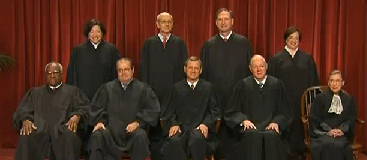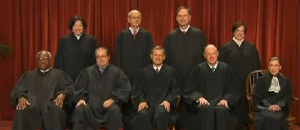Is It Time for a New Voting Rights Act?

For all of the anticipation leading up to the Voting Rights challenge at the U. S. Supreme Court there are a couple of things that bubbled to the surface and that are worth noting in it’s wake: Justice Scalia’s “racial entitlement” comment and the idea that maybe we’re better off with judicial creative destruction, where Section 5 is struck down to make room for a new, more comprehensive voting rights enforcement code.
On the first count, Scalia’s statement was unexpected but not uncharacteristic. He said Section 5 of the Voting Rights Act (VRA) amounted to a “perpetuation of racial entitlement.” Of course Scalia would say something like that, it’s not the first time he’s lifted his robe to let us see his stripes, so we shouldn’t be surprised. But reports from the chamber state there was an audible gasp at the statement. It’s one thing to think it, and to know Scalia thinks as he does, but it’s another to hear it so blatantly.
The remark didn’t go unnoticed. The New York Times reports:
That remark created the sharpest exchange of the morning, with Justice Sonia Sotomayor on the other end. “Do you think that the right to vote is a racial entitlement?” she later asked a lawyer challenging the law, with an edge in her voice that left little doubt she was responding to Justice Scalia’s statement. “Do you think that racial discrimination in voting has ended, that there is none anywhere?”
That leads me to the second item, the creative destruction.
At one point during the questioning Chief Justice Roberts asked if “the citizens in the South are more racist than citizens in the North.” If truth be told, no, they’re not. Given the evidence of voting delays and disenfranchisement in the North, it’s possible to say that the North and the South are equal on this count. So from this point of view Section 5 of the VRA is antiquated and needs a makeover; it needs to be struck down to make room for a larger, more inclusive law that casts a wider enforcement net – not limited to only nine states and parts of others. Some call it a “modern voting rights act.”
A model of how this can be done is in the act itself. Section 3 of the VRA – a.k.a. the “pocket trigger” – gives federal courts the authority to place states and political subdivisions that have violated the Fourteenth or Fifteenth Amendments under preclearance. In other words, Section 3 is a way of putting bad actors under the scrutiny called for in Section 5. It’s also known as the bail-in clause and it’s been used a few times in the past.
For Latinos and Latino voters this is very important. As the Latino community grows and spreads there will be a need for a voting rights enforcement code that is more portable, for lack of a better word – a code that follows them as American citizens, across the country, and not as a minority group in selected states in the South.
Does that mean that we tear down the existing VRA and build a new one in its place?
That would have to come through congress, so, good luck floating a new Voting Rights Act through the swamp that’s become.
Maybe the clunky old 1965 version of the VRA is good enough for now, reauthorized as it has been over the years. And maybe we’ll have to rely on it as we figure out a better way to move forward. The threat, though, is that this latest challenge has put Section 5 in peril, Scalia’s statement is proof enough of that.
[Photo courtesy c-span]

